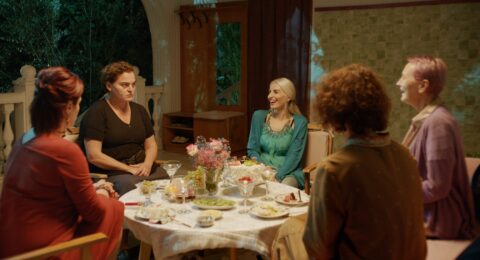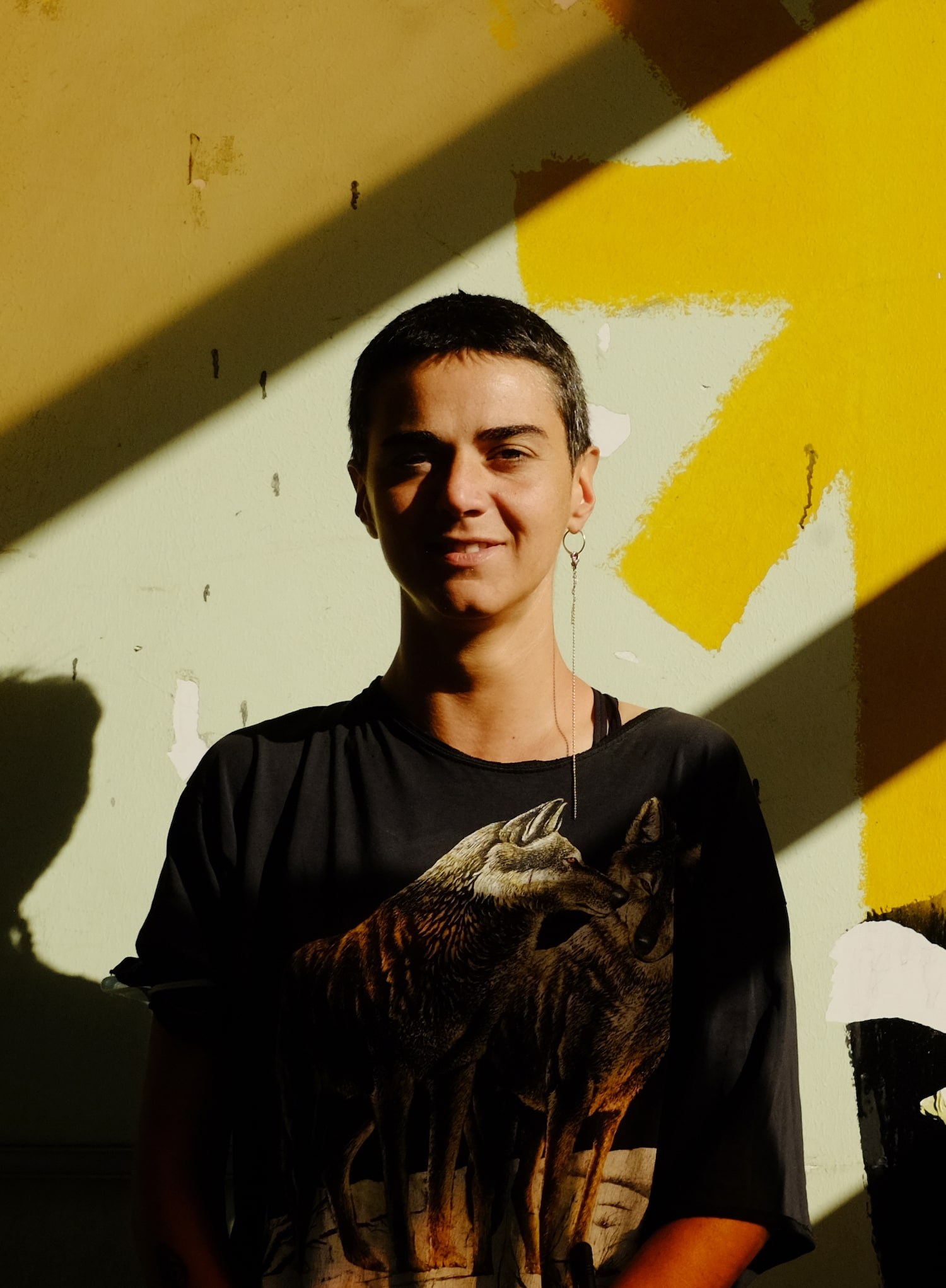
First off, what a stunning performance from Eka Chavleishvili! Can you tell me about your experience together on Wet Sand and why you gave her the lead in Blackbird?
In Wet Sand, she had a very secondary role. I found her through the casting director and what I really liked about working with her was that I found we had the same kind of heartbeat. After we’d finished, I was recording some stuff for the post-production and I got the novel Blackbird Blackbird Blackberry (Tamta Melashvili, 2021). I read it on a plane flying to Geneva. After I read the first page, it was clear to me that Eka was the one that had to perform the Etero role. I called her right away and she read it.
I think what was very important and also what was really powerful was how we were kind of going with the same rhythm. I think that this rhythm is very important. I believe that you can collaborate with every person if there is this same kind of beat you’re both following. So, I think we were just really tuned in and that’s how we made this work together.
Sort of like an unspoken language you can use without having to say too much and the actors understand?
Exactly. I’ve worked with professional actresses, but not that massively in terms of an actress who had already a big experience in the past. It was very interesting for us to really find really something peculiar and specific and very personalized for her — and not to kind of make her act the way we were experiencing in other projects.
We talked a lot. We just went through each detail, each movement, each gesture, and explored her full backstory together. During the process, there were keywords and key concepts that were crystal clear about who Etero was.
And if things were going in a bit of a different direction, I would say: “Okay, remember who she is.” Then it was very easy to get back on the same track.
So I think it was a great pleasure when there was a take where I was not really satisfied, and I could just get close to her and before I would say what I wanted, she said, “I think I know what you’re gonna tell me.” It was fascinating how we could just like understand each other and feel that we were just doing the same character, you know?
Your film had an intimacy coordinator for the sex scenes. Can you tell me a little bit about working with them and creating this comfort with the actors and also exploring sexual intimacy with older people? Do you think that’s something that cinema is lacking right now?
I would say that I didn’t have the experience to make all that work. I could stage or I could imagine what I wanted, but I felt that it was really necessary — that not only me trusting in actors and actors trusting me was enough. There was some other work that we had to do. We had a person who was with us for three days. She’s a dancer and she was more focused on working on the movement.
She kind of took out all this sexuality from the movement and it somehow stayed in their head that it was just a movement and then it became like a dance.
It was very important for me that actors in the sex scenes felt very confident with what they’re doing. I was working more on just making them feel, “What is this thing about?” while the intimacy coordinator could work on physicality and designing the movement. We just made it work because all felt very comfortable— it was very important for me that they weren’t embarrassed. We are not used to seeing these kinds of bodies that aren’t considered conventionally beautiful.
Audiences are filled with all kinds of bodies, so I think they respond positively when they see a variety onscreen.
Absolutely, of course. We all have different bodies and all of them have the legitimacy to exist. They all have their own beauties and flaws.
Blackbird feels kind of like an extension of Wet Sand — both stories are critical of rural life and the oppression that comes along with it. Would you say that these small villages are the film’s main antagonists?
I think they are and it’s easier telling a story where I have like a clear antagonist. I think that it’s always kind of linked to the place where I grew up, a place I know well and where the culture is a part of me. I think it is this kind of little village, or these places, that make these kinds of problems wider. Of course, things like this wouldn’t happen in bigger cities. So yeah, the village for me, becomes a kind of villain…
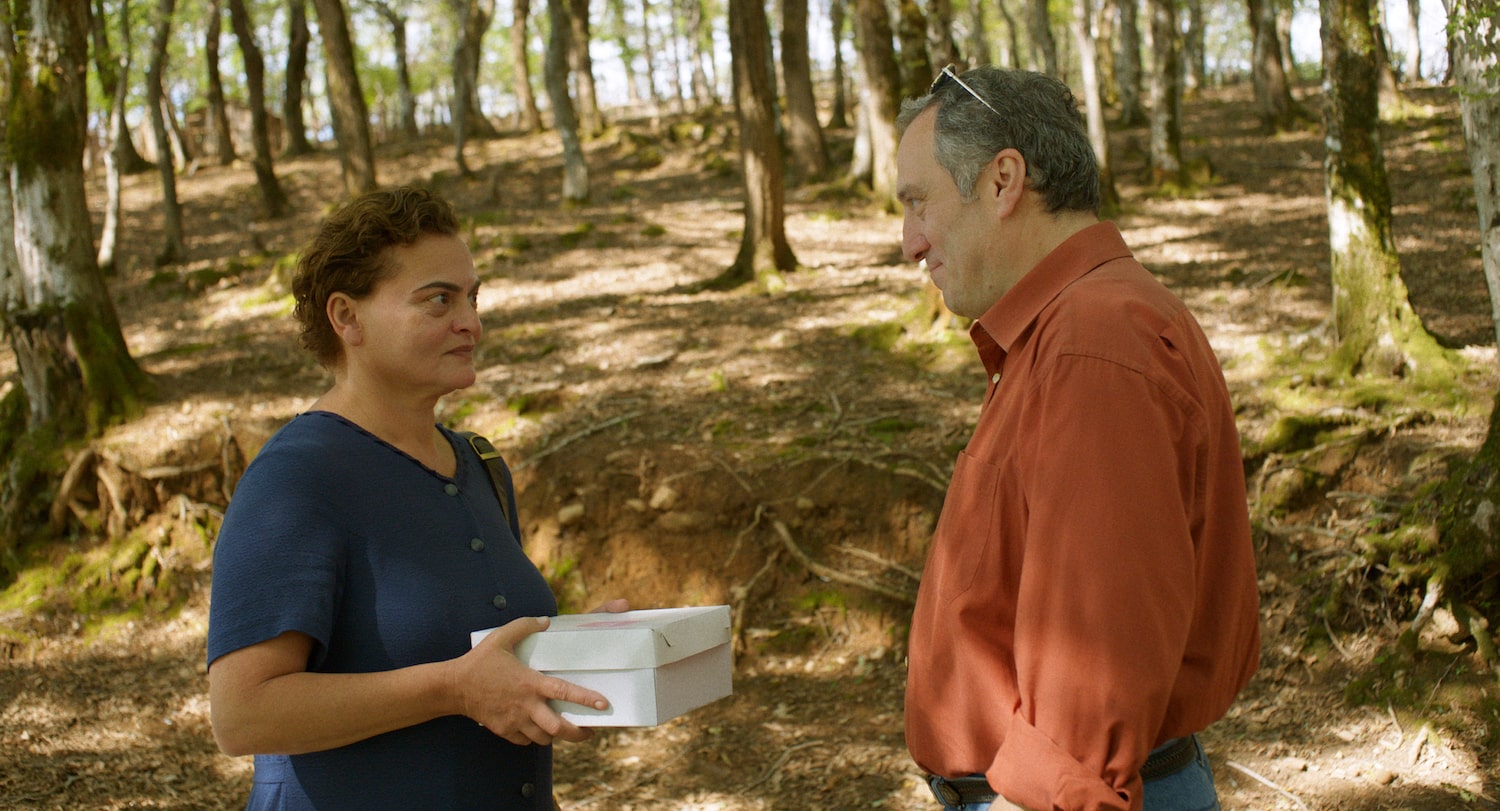
So how do Georgian audiences react to this sort of critical eye on their rural ways?
In general?
Yeah. Both films I’ve seen of yours are critical of small towns and their gossip and bigotry. I think each country has a different reaction to a mirror being held up to some of their bad behaviours, so I’m curious about the general response to your films at home.
It’s a very different experience and I still need the time to digest the feedback I received after Wet Sand. It’s not only about the critics — it goes even beyond that. It’s something that people don’t want to talk about, so there is this refusal right away. They say: “It’s not about us. We are not like that. We are not part of this.” I guess that was the first thing I took away from their response.
At first, I thought it was interesting and I was kind of reflecting, “Is it something where I got really far from this place and I’m kind of imagining things?” I’d been living 10 years away from the country, even though I go back very often. Of course, I started to reflect on this, but I think it’s deeper and it’s more cultural how they turn their backs on it and don’t wanna see what’s rotten at the core.
Your films feel patient and unhurried, without a lot of camera movement and cuts. Tell me a little about creating this sort of slower rhythm and how it relates to your stories.
I work with the cinematographer Ágnes Pákózdi. We’ve been working together for 10 years — she’s been involved in everything from the beginning. When the last treatment is done, she comes with me to do location scouting. We go through it and she’s almost a co-director in a way. She makes the process much more flexible and free because I know that we are on the same page. And if there are moments where it doesn’t work (which is very often), we can find a solution super quickly because she knows what we’re doing from the very beginning, from the very heart of the project.
When I had the first treatment for Blackbird, I asked her to come with me and we didn’t have any precise village or locations yet. It was just kind of taking a journey where we were discovering things together to somehow create this mood and atmosphere.
After this, I was working on new versions of the screenplay, and she would follow up and we started to work on making storyboards… We had like an enormous amount of visual references and were feeding each other ideas and sharing our visions. And the rhythm — it’s hard for me to explain. It’s not something that intentional, like: “I wanna make a slow film or a fast film.”
The story sort of dictates the rhythm?
Yeah, exactly.
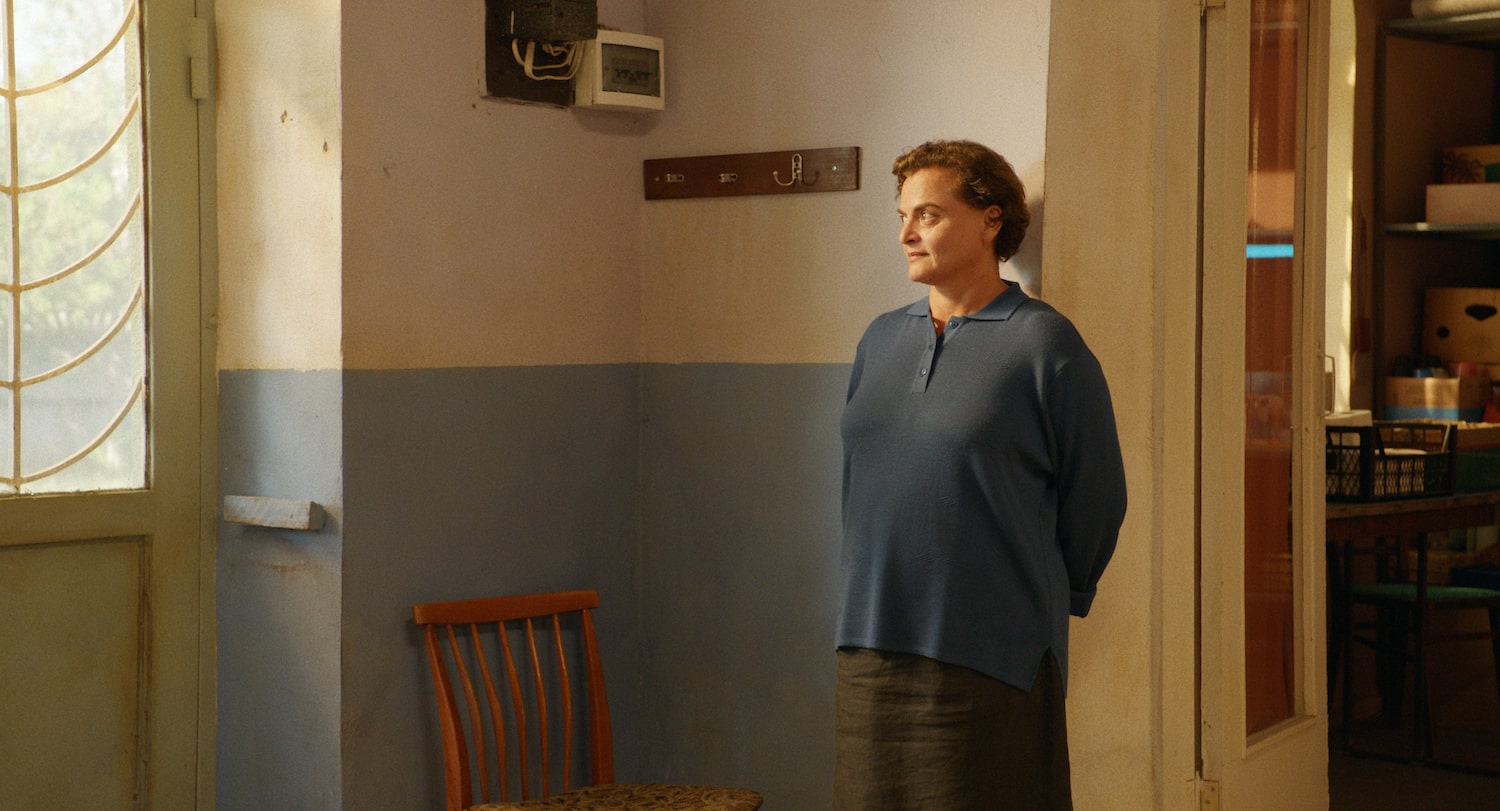
I have another collaboration question. You co-wrote the film with Nikoloz Mdivani. Did you share a similar approach in terms of writing and structuring the story?
It was my first time working with Nikoloz. When I got the idea after I read the novel I just kind of pitched it and he said, “Okay, Let’s do it.” It’s interesting. So after I got the rights from the author, we started to work together. I thought that it would be nice to work with someone else because I already had experience with writing a screenplay with my brother.
Before, this process of being alone writing…it’s actually why I stopped painting and stopped doing what I studied before — I hated to be alone and torturing myself. When I started to work with other people, with my brother and others, things were richer and more fun. You have more possibilities and you’re not just sitting there performing the tortured artist role.
What were the challenges in adapting a novel?
The novel has no chronology in terms of a linear narrative. It goes from childhood to the present and it’s all interior monologue and narration. I think the main challenge was like, how to translate this and just place it in the present. Like, how to show this woman who is 48 years years old with a huge history with a lot of baggage she’s carrying without kind of bringing it back to her childhood, while also bringing this context of violence and patriarchal oppression.
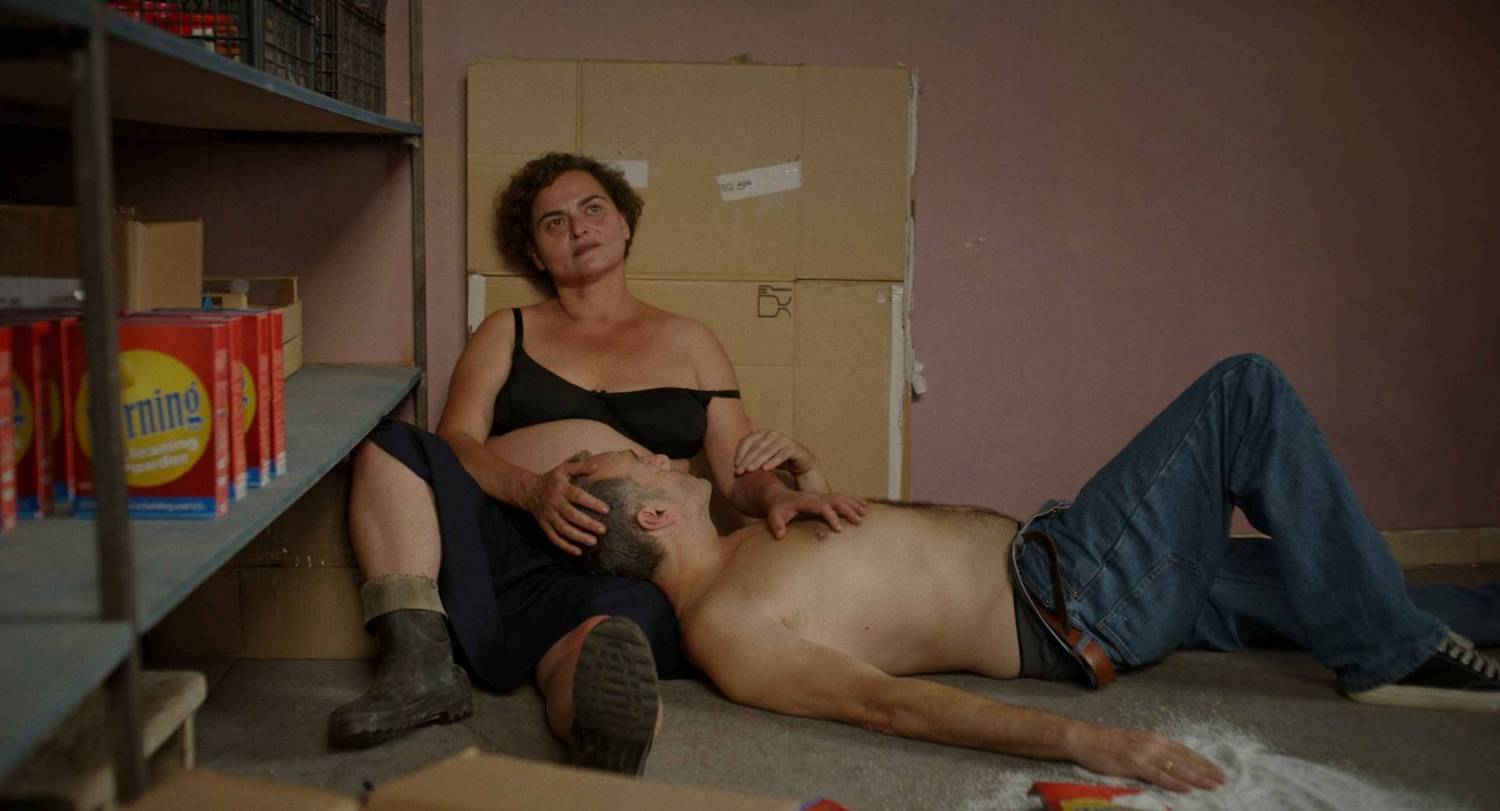
I love talking to directors about other people’s films, and I was reading that you and your brother watched films all the time growing up. What’s one film that you both agree is an absolute masterpiece or something that really brought you together?
Definitely The Good, the Bad, and the Ugly (Sergio Leone, 1966).
How about one on which you vehemently disagree?
All of the Coen Brothers’ films. He loves them and I don’t (laughs).
Not even Fargo (Coen Brothers, 1996)?
No, I’ve never understood Fargo. I’ve tried to watch it so many times but I don’t get it.
I can try again. Maybe there is a moment when I’ll be open up to it, but I’m like, “Okay. No. Not today.”
The last time I saw it I noticed they didn’t introduce Frances McDormand until the 40-minute mark or so, which feels a bit late for the main character. Is there anything super mainstream that people might be surprised you like? Do you like action movies?
I love every kind of movie really. I’m really fond of romantic comedies. I love them. I have a week every year where I really need to just sit and watch a lot of romcoms.
I feel like you could remake the original script for Pretty Woman (Garry Marshall, 1990), which was really dark. It ends with Edward kicking Vivian out of the limo and then she and Kit go to Disneyland together on a bus. The end. Last question: do you plan on making more films about Georgia? Any dreams of going to Hollywood?
I totally wanna write some different stuff and try new things. The next film I have going is still about Georgia. So let’s see how it goes after.
Maybe a rom-com?
I would love to do that (laughs)! I’m sure I’m gonna do an amazing rom-com at some point.
We’ll be there on opening night. Thanks for the chat, Elene!
Thank you!
Jared loves movies and lives with Kiki in Berlin.
